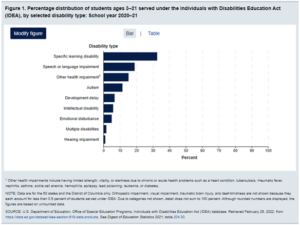K-12 special education needs are being reshaped by external forces. Amidst increasing cyber threats and violence in schools, teachers and staff shortage pressures persist. The Covid-19 pandemic and video homeschooling have spawned a growing need for mental health support to treat depression, anxiety, and suicide prevention. Test scores indicate it is an uphill battle for academic recovery post-pandemic. Family engagement focus amid the growing politicization of school curricula creates new challenges for the educational community. Meanwhile, there has been nearly a 50 percent increase in special education students since the 1990s, with the most pervasive disability among these students being specific learning disabilities.

National Center for Education Statistics
Terminology
Familiar phrases such as special education (SPED) and inclusion are falling from favor. The SPED label implies these learners and educators are so different they belong in separate systems. However, special instructions or services for Individualized Education Programs (IEPs) can be delivered anywhere. The vast majority of services are now provided within the context of general education. Mainstreaming the concept of inclusion but not referring to it as such helps special education students feel like they belong. For example, it will be standard for teachers planning a school event to make closed-caption, signers, noise-blocking headphones, and fidget items available for students at the event. Students are now referred to as “with a disability” rather than being “disabled” students. While some of these changes are subtle, it helps to foster better social-emotional learning. The long-term goal is to reduce or eliminate disability-specific classrooms and programs.
Federal Disability Laws
There are three major laws protecting the rights of people experiencing disabilities:
- Americans with Disabilities Act (ADA) – This is a civil rights law prohibiting disability discrimination by schools, employers, and anyone offerings goods and services to the public.
- Individuals with Disabilities Education Act (IDEA) – This education law requires public schools to meet the unique needs of eligible K-12 students by providing services for those experiencing disabilities.
- Section 504 of the Rehabilitation Act (Section 504) – This civil rights law prohibits disability discrimination at schools that receive federal funding. Schools can meet these requirements by removing barriers to learning for all students.
Personalized and Self-Led Learning
The traditional one-size fits all approach to teaching is becoming less popular. Educators are increasingly adopting personalized learning methods in special education, where instruction is tailored to the individual needs of each student. The goal is to provide more targeted support and interventions to students with disabilities. Self-led learning is responsive to the learning gaps widened during the pandemic as students work to recover this learning. For example, schools will leverage tutoring services for struggling students or provide new learning opportunities through online courses.
Assistive Technology
Advancements in technology are fostering the development of a wide range of assistive technology devices and software, which help students with disabilities to learn and communicate more effectively. Augmented reality (AR), virtual reality (VR), and artificial intelligence (AI) will become more prevalent educational tools and resources. Schools are investing more than ever to provide the latest technology to support their students.
Data-Driven Instruction
Data-driven instruction involves using data to inform instruction and decide how best to support students with disabilities. As metrics and analysis become more sophisticated, schools increasingly use data to evaluate the effectiveness of their special education programs and interventions.
Social-Emotional Learning (SEL) and Collaboration
Special education teachers are increasingly working collaboratively with general education teachers, parents, and other professionals to support students with disabilities and pool expertise and resources to eliminate disability-specific classrooms and programs. SEL continues to be a crucial part of pandemic recovery for students by teaching social and emotional skills alongside academic skills. Supporting students’ social-emotional development creates a less stressful learning environment and increases the student body’s overall well-being.
Multicultural Education
As schools become more diverse, educators increasingly recognize the importance of multicultural education in special education. Incorporating the cultural backgrounds and experiences of students with disabilities into the curriculum and teaching methods enhances learning and fosters inclusivity.
How a Disability Attorney or Special Needs Attorney Can Help
Disability attorneys, and lawyers who focus on special needs planning, can play a critical role in helping parents with children in special education in many ways. Some examples include:
1. Providing Legal Advice
Disability attorneys understand the laws and regulations that govern special education and can provide legal advice and guidance to parents of children with special education needs. Specifically, the Individuals with Disabilities Education Act (IDEA) outlines the rights of children with disabilities to free and appropriate public education.
2. Advocating for Student’s Rights
Disability attorneys can advocate for the rights of students with disabilities throughout the special education process, including the development of individualized education plans (IEPs) and in disputes with school districts over the provision of services.
3. Representing Parents in Dispute Resolution
Disability attorneys can represent parents in dispute resolution proceedings, such as mediation or due process hearings, when disagreements arise between parents and school districts over special education services.
4. Reviewing Documents
Disability attorneys can review IEPs, evaluations, and other documents relating to a child’s special education to ensure they meet the legal standards and the child’s needs.
5. Educating Parents
A disability attorney can educate parents about their rights and the special education process, helping them to navigate the system and effectively advocate for their child.
As trends change in special needs education and schools become increasingly responsive to the challenges brought about by the pandemic, laws, guidelines, and regulations will be updated or rewritten. A disability attorney will be aware of these changes and can play a crucial role in helping parents ensure their child receives the education and support they need to thrive.
We hope you found this article helpful. Please contact our office today at (559) 435-0455 and schedule a free consultation to discuss your legal matters. We look forward to the opportunity to work with you.

